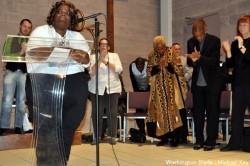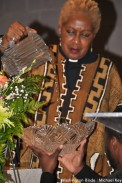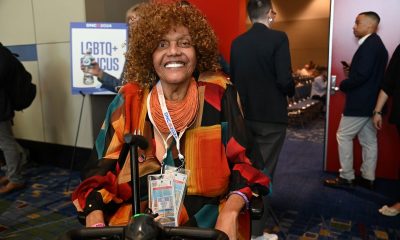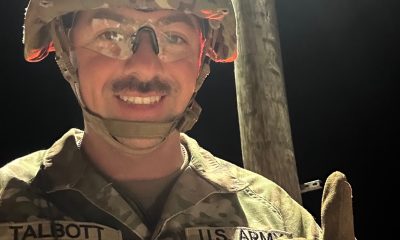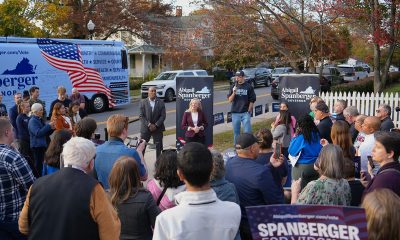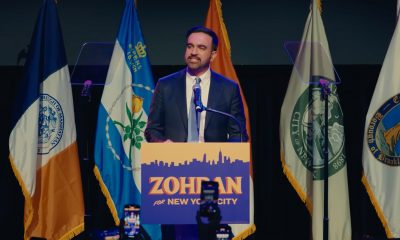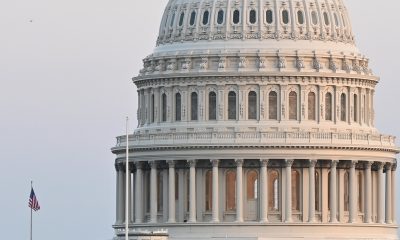Local
Trans community, allies observe Day of Remembrance
Activists vow to persevere following year of increase in anti-trans violence
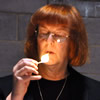
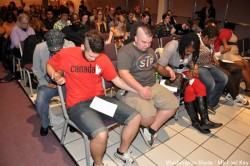
Participants pause to remember those who have been the victims of anti-trans violence. (Washington Blade photo by Michael Key)
More than 150 people turned out Sunday night at D.C.’s Metropolitan Community Church for the 12th Annual Transgender Day of Remembrance, an international event that recognizes transgender people who have lost their lives to anti-trans violence.
Organizers said the annual observance began in 1999 in recognition of Rita Hester, a transgender woman in Boston who was killed the previous year in what authorities have called an anti-transgender hate crime. Since that time, Transgender Day of Remembrance events have taken place in dozens of cities in the U.S. and abroad.
“These were our brothers and sisters, family members, friends, people of faith, innocent and quite often, as is the case in this crazy world of ours, they have been taken from us by violence,” said transgender activist Jessica Xavier, one of the organizers of the D.C. event.
“But they’re not martyrs,” Xavier said. “They didn’t die for a cause. They weren’t a member of any political movement. They were human beings, just like all of us…This is a time for caring and compassion, for healing and for hope, for sorrow but also strength.”
MORE IN THE BLADE: TRANS ACTIVISTS HOLD PROTEST OUTSIDE POLICE, US ATTORNEY OFFICES
The highlight of the event included the reading of the names of transgender people from the D.C. area and others from across the nation and throughout the world that lost their lives to hate violence based on their gender identity or expression.
Following the reading of each name, the audience responded by saying, “We remember them.”
Transgender activists Julius Agers and Ruby Corado read the names of local transgender victims who lost their lives between 2000 and 2009 and international victims, including several from Latin America, who lost their lives in 2011.
Corado read the name of Lashai Mclean, a 23-year-old D.C. transgender woman who was shot to death in Northeast D.C. in August of this year. Agers read the name of Gaurav “Gigi” Gopalan, a 35-year-old aerospace engineer who was found fatally wounded on a sidewalk in the city’s Columbia Heights section on Sept. 10 of this year.
Police said Gopalan died in a hospital a short time later of blunt force trauma to the head. Police have yet to make an arrest in either of the two cases.
Gopalan, who lived his professional life as an out gay man, was dressed in women’s clothes when he was found unconscious on the street, according to police. Although many of Gopalan’s friends said they considered him a gay man, transgender activists say he likely was targeted because of his appearance as a transgender woman.
Earline Budd, an official with the D.C. organization Transgender Health Empowerment and the lead organizer of Sunday night’s Transgender Day of Remembrance, said the event has grown significantly over the past several years.
Budd told the gathering that a greater recognition that anti-transgender violence is rooted in ignorance, hatred and discrimination would lead to the eventual decrease in such violence.
Budd and transgender activist Ruby Corado said they were encouraged by the large numbers of gays, lesbians and straight allies that have joined the effort to fight anti-transgender violence. Corado praised D.C. police officials, including Chief of Police Cathy Lanier, for speaking out and establishing internal police policies aimed at curtailing anti-transgender discrimination.
However, the two said police have yet to solve a string of violent attacks over the past several years against transgender residents of the District, including the murders this year of Mclean and Gopalan.
“You’re hearing an outcry from the community for getting these cases solved,” said Budd. “And again, I’m going to appeal to Chief Lanier to do more in terms of trying to solve some of these transgender murders.”
Police have said murders of both transgender people and gay men often are difficult to solve because the perpetrators usually are strangers whom the victims met at the time of or shortly before the murder. Police say most of the non-LGBT murders are committed by people who have had some type of relationship with the victim, making it easier for investigators to find witnesses who identify a suspect.
Jeffrey Richardson, director of D.C. Mayor Vincent Gray’s Office of LGBT Affairs, told the gathering that Gray considers transgender residents an important part of the city’s diverse and vibrant community.
“We believe people are to be judged by the content of their character, not by their gender identity,” Richardson said. “Let’s rid our city and our country of the hatred that leads to violence and the loss of life.”
Rev. Abena McCray, pastor of Unity Fellowship Church of D.C., which has a largely African American LGBT congregation, said transgender residents are welcome in the city’s faith community.
Following a selection of songs by her church’s Agape Praise Choir, McCray delivered a sermon-like talk calling for acceptance and support for the city’s transgender residents.
“You are unique, and the Creator loves you just as you are,” she said. “You are not a mistake. God doesn’t make mistakes…We celebrate transgender today. Lord, you knew what you were doing when you created transgender.”
Corado said support of the event by the larger LGBT community has been uplifting to transgender residents despite the continued incidents of anti-trans violence in D.C.
“I am extremely happy because the support that we have gotten from the LGBT community and allies has been outstanding in the last couple of years,” she said. “It’s just amazing that people do care about what happens to us. And it makes us feel like we’re not alone.”
Transgender activist Jason Terry of the D.C. Trans Coalition said he is encouraged that the Day of Remembrance took place less than a week after the White House hosted an historic, first-ever meeting on transgender issues, including the issue of anti-trans violence.
“This is a great event, as always,” he said of the Day of Remembrance. “It’s so important to pause and remember those that we’ve lost. We’ve had a bad year. The way we honor those deaths is by moving forward towards justice.”
District of Columbia
High cost of living shuts essential workers out, threatens D.C.’s economic stability
City residents don’t always reflect those who keep it running

When Nic Kelly finishes her 6 a.m. shift as a manager at PetSmart, she walks to her bartending job at Alamo Drafthouse in Crystal City to serve cocktails, beers, and milkshakes for hundreds of guests.
Kelly, 26, doesn’t work a combined 60-65 hours per week to pocket extra cash –– she does it to barely make her almost $1,700 rent each month.
“I’m constantly working, and some days I work two jobs in the same day,” Kelly said. “But twice now I’ve had to borrow money from my mother just to make sure I pay my full rent.”
Yesim Sayin, D.C. Policy Center executive director, said this is unfortunately how the D.C. area is structured –– to keep essential workers, service employees, and lower-income people out and those with greater economic mobility in.
The DMV area’s high cost of living makes it near-impossible for employees who keep the area running to make a living, Sayin said. In 2022, only 36% of D.C.’s essential workers lived in the city, according to a D.C. Policy Center report. D.C. is also ranked 13th in the world for highest cost of living as of Nov. 7.
But for Sayin, there’s more work for policymakers to get done than simply acknowledging the high cost of living. Take a look at how current policies are impacting residents, and what long-term solutions could help the DMV thrive.
Feeling the high cost of living
D.C. has the highest unemployment rate in the country at 6.0% as of August. Sayin said the city’s high unemployment rate reflects a lack of geographic mobility in its population, meaning those who can’t find jobs can’t afford to look outside of the DMV area.
Though there are job training groups working to close the unemployment gap, securing a job –– let alone two –– rarely guarantees a comfortable lifestyle for essential and service employees.
A single-person household in D.C. with no children must make at least $25.98 an hour to support themselves, according to the Living Wage Calculator. That number jumps to $51.68 an hour for a single adult with one child. Minimum wage in D.C. is $17.95 an hour and $10 an hour for tipped employees.
Whether it’s utilizing free meals at the Alamo to save on groceries or borrowing money to make rent, every week could bring a different sacrifice for Kelly.
While Kelly lives and works a few minutes south of D.C., Sayin said the connectedness of the DMV means you don’t have to travel far to feel the withering effects of the area’s high cost of living.
“People don’t really care what flag adorns their skies,” Sayin said. “They’re looking for good housing, good schools, cheaper cost of living, and ease of transportation.”
For those that stay in the DMV area, those conditions are hard to come by. This can lead to people working multiple jobs or turning to gigs, such as Uber driving or selling on Etsy, to fill income gaps. Sayin said there are short-term benefits to securing these gigs alongside a primary job, such as helping people weather economic storms, avoid going on government assistance or racking up debt.
But she said the long-term implications of relying on gigs or other jobs can harm someone’s professional aspirations.
“You can spend three extra hours on your own profession every work week, or you can spend three hours driving Uber. One gives you cash, but the other gives you perhaps a different path in your professional life,” Sayin said. “And then 20 years from now, you could be making much more with those additional investments in yourself professionally.”
There’s a strong demand for work in D.C., but when the city starts suffering economically, those who live outside the area –– usually essential or remote workers –– will likely find work elsewhere. Sayin said this negatively impacts those employees’ quality of life, giving them less professional tenure and stability.
D.C.’s cost of living also centralizes power in the city, according to Sayin. When lower-wage employees are priced out, the residents who make up the city don’t always reflect the ones who keep it running.
“Ask your Amazon, Uber or FedEx driver where they live. They’re somewhere in Waldorf. They’re not here,” Sayin said.
Working toward an accessible D.C.
Build more. That’s what Sayin said when thinking of ways to solve D.C.’s affordability crisis.
But it’s not just about building more –– it’s about building smartly and utilizing the space of the city more strategically, Sayin said.
While D.C. has constructed lots of new housing over the years, Sayin noted that they were mostly built in a handful of neighborhoods tailored to middle and upper-class people such as The Wharf. Similarly, building trendy small units to house young professionals moving to the city take up prime real estate from struggling families that have much less geographic mobility, she said.
“The affordability problem is that today’s stock is yesterday’s construction,” Sayin said.
Solving these issues includes ushering in a modern perspective on outdated policies. Sayin cited a D.C. policy that places restrictions on childcare centers built on second floors. Since D.C. parents pay the highest rates in the country for childcare at $47,174 annually, she said loosening unnecessary restrictions could help fuel supply and lower costs for families.
Sayin said policymakers need to consider the economic challenges facing residents today, and whether the incentives and tradeoffs of living in D.C. are valuable enough to keep them in the city.
For Kelly, the incentives and tradeoffs of staying in the DMV area aren’t enough. She’s considered moving back in with her mom a few times given how much she has to work just to get by.
Aside from wanting higher compensation for the work she does –– she noted that businesses can’t operate without employees like her –– Kelly also questioned the value of the tradeoff of moving so close to the city.
“There’s no reason why I’m paying $1,700 for a little studio,” Kelly said. “You also have to pay for parking, utilities aren’t included and a lot of residents have to pay for amenities. We are just giving these property management companies so much money, and we’re not really seeing a whole lot of benefit from it.”
Sayin said placing value on the working people of the city will inject fresh life into D.C.’s economy. Without a valuable tradeoff for living in or around the city, there’s little keeping essential and service employees from staying and doing work taken for granted by policymakers.
District of Columbia
Activist hosts Diwali celebration in D.C.
More than 120 people attended Joshua Patel’s party on Nov. 9.

LGBTQ activist and businessman Joshua Patel hosted a community Diwali party on Nov. 9.
Patel organized the event as a community gathering amid the Trump-Vance administration’s policies against LGBTQ inclusion and DEI. The event, held at the Capo Deli speakeasy, drew more than 120 attendees, including local business leaders.
Patel is a franchise owner of ProMD Health, recently awarded as the best med spa by the Washington Blade. He is also a major gift officer at Lambda Legal.
Patel noted that upon moving from New York to Washington in 2022, he desired a chance for community-based Diwali celebrations. He stated that the city offered minimal chances for gatherings beyond religious institutions, unless one was invited to the White House’s Diwali party.
“With our current administration, that gathering too has ended — where we cannot expect more than Kash Patel and President Trump lighting a ‘diya’ candle on Instagram while simultaneously cutting DEIB funding,” Patel said.
In addition to celebrating the festival of lights and good over evil, Patel saw the event as a moment to showcase “rich, vibrant culture” and “express gratitude.”
Patel coined the celebration a “unifier.”
“From a spiritual angle, Shiva was the world’s first transgender God, taking the form of both “male” and “female” incarnations,” Patel said. “The symbolism of our faith and concepts are universal and allows for all to rejoice in the festivities as much or little as they desire.”
Savor Soiree, DMV Mini Snacks and Capo Deli catered the event. DJ Kush spun music and Elisaz Events decorated the Diwali celebration.
The Diwali party also featured performances by former Miss Maryland Heather Young Schleicher, actor Hariqbal Basi, Patel himself and Salatin Tavakoly and Haseeb Ahsan.
Maryland
Harford school board appeals state’s book ban decision to circuit court
5-2 ruling in response to ‘Flamer’ directive
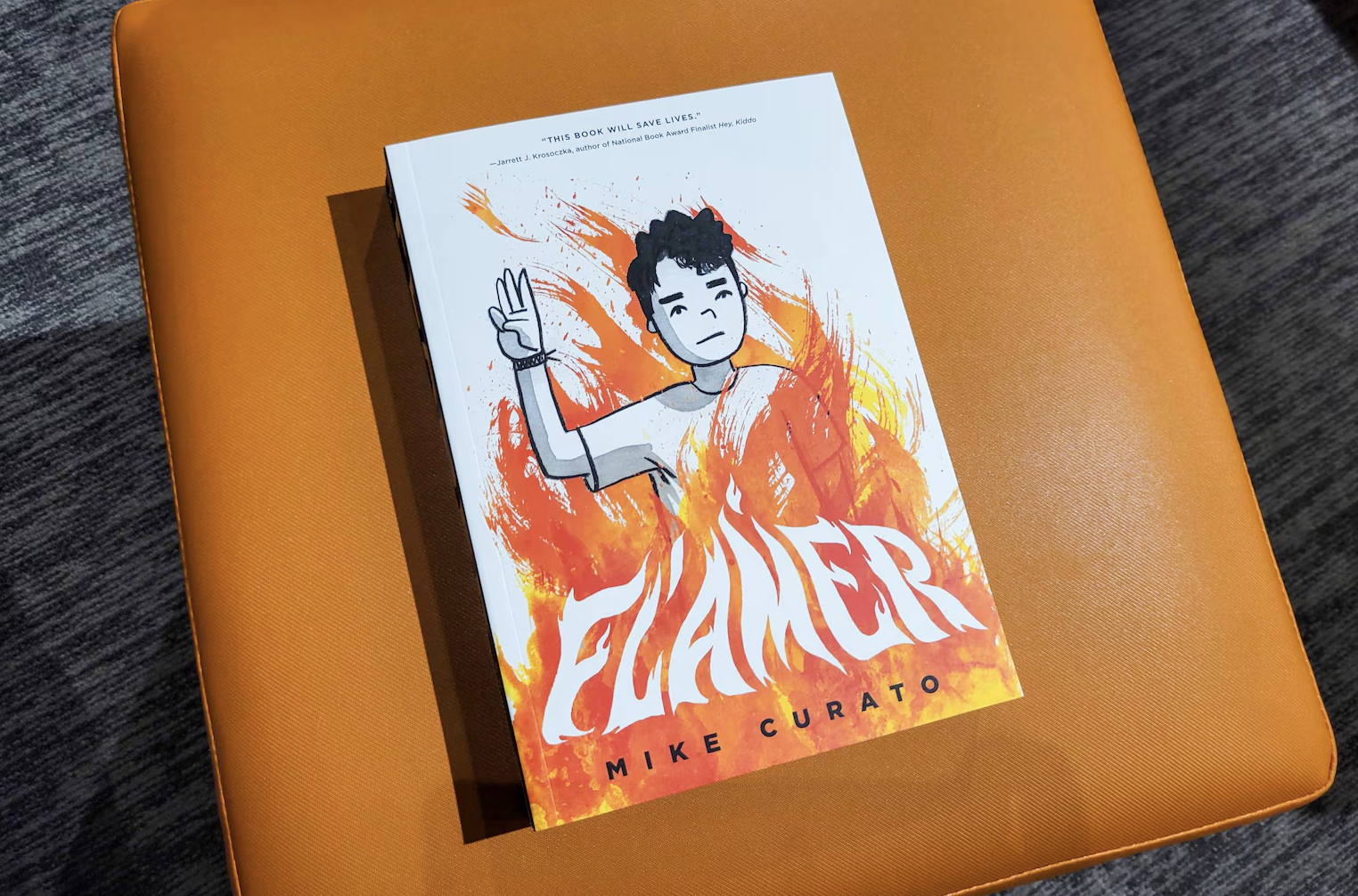
By KRISTEN GRIFFITH | Marking a historic moment in Maryland’s debate over school library censorship, Harford County’s school board voted Thursday to appeal the state’s unprecedented decision overturning its ban of a young adult graphic novel, pushing the dispute into circuit court.
The 5-2 vote followed a recent ruling from the state board overturning Harford’s ban of the book “Flamer.” In a special meeting Thursday afternoon, board members weighed whether to seek reconsideration or take the matter to circuit court — ultimately opting to appeal.
The book “Flamer” is by Mike Curato, who wrote about his experience being bullied as a kid for being gay.
The rest of this article can be found on the Baltimore Banner’s website.

